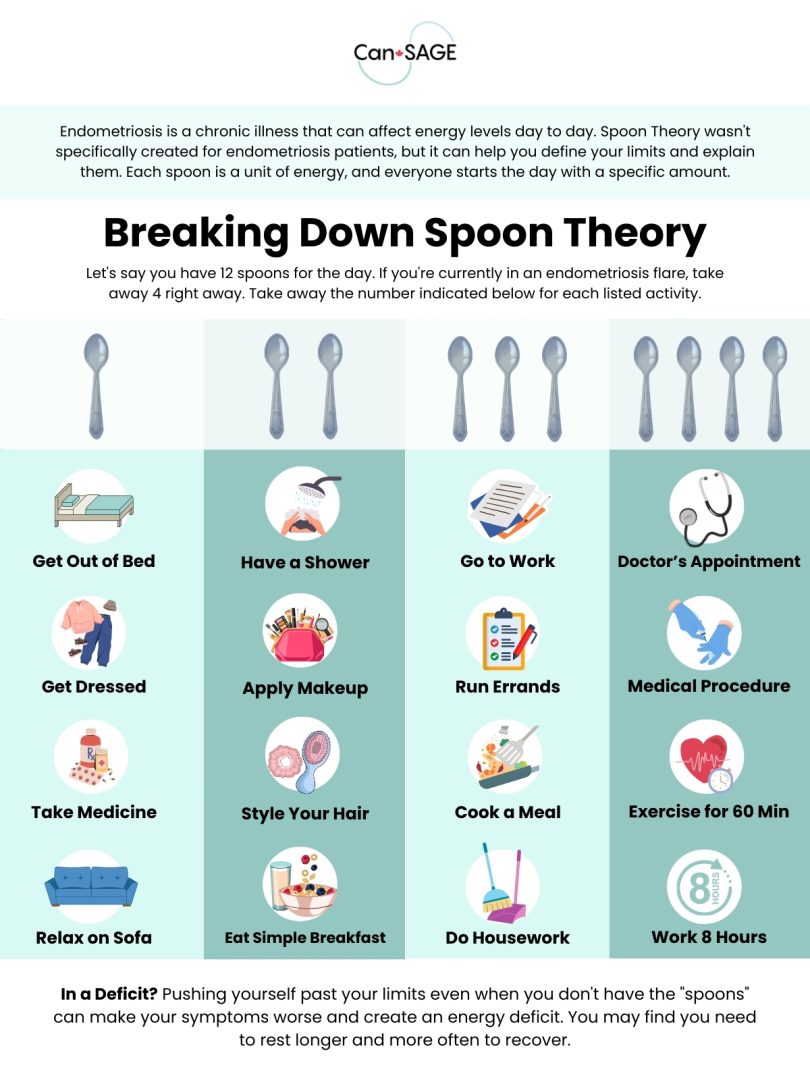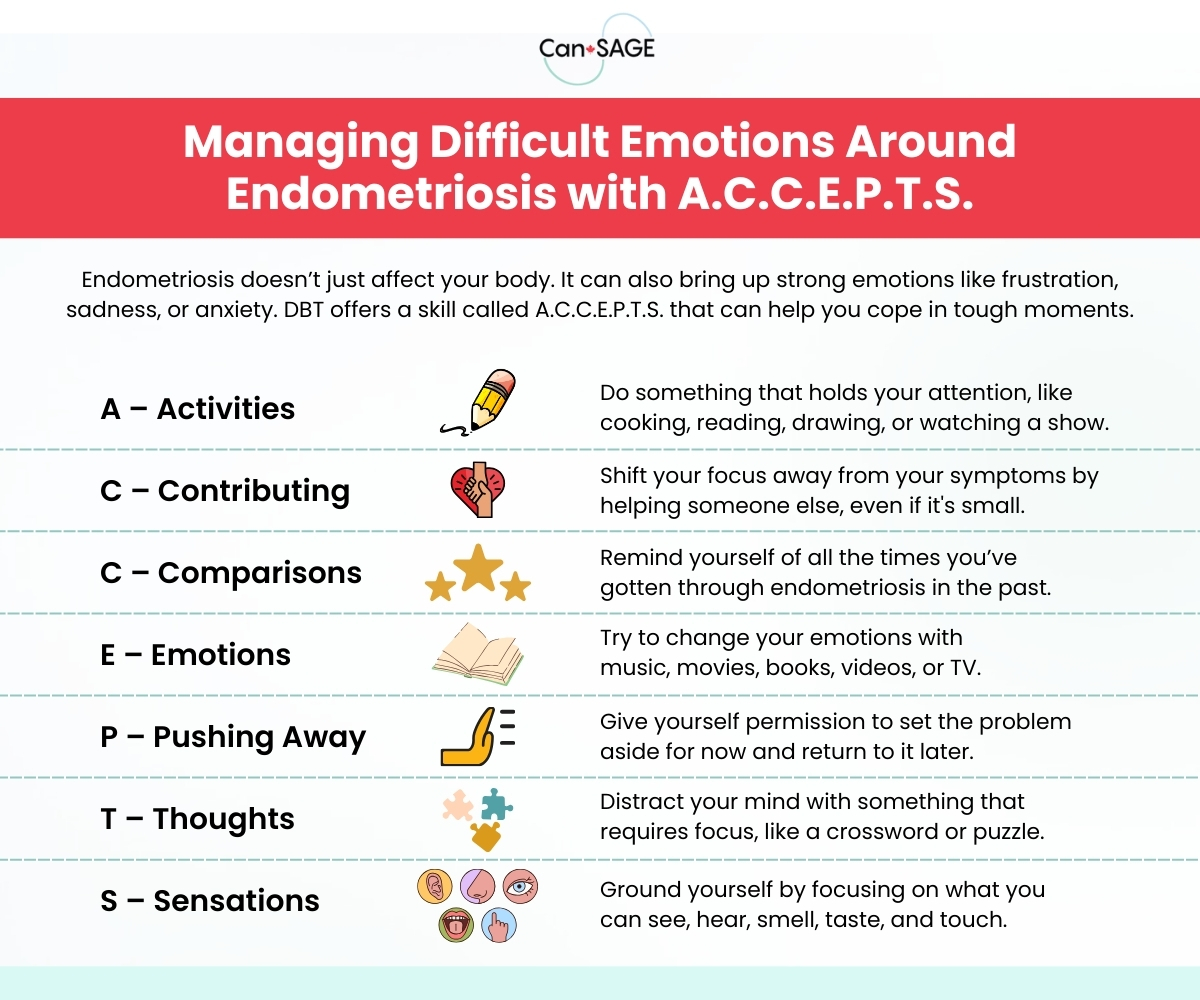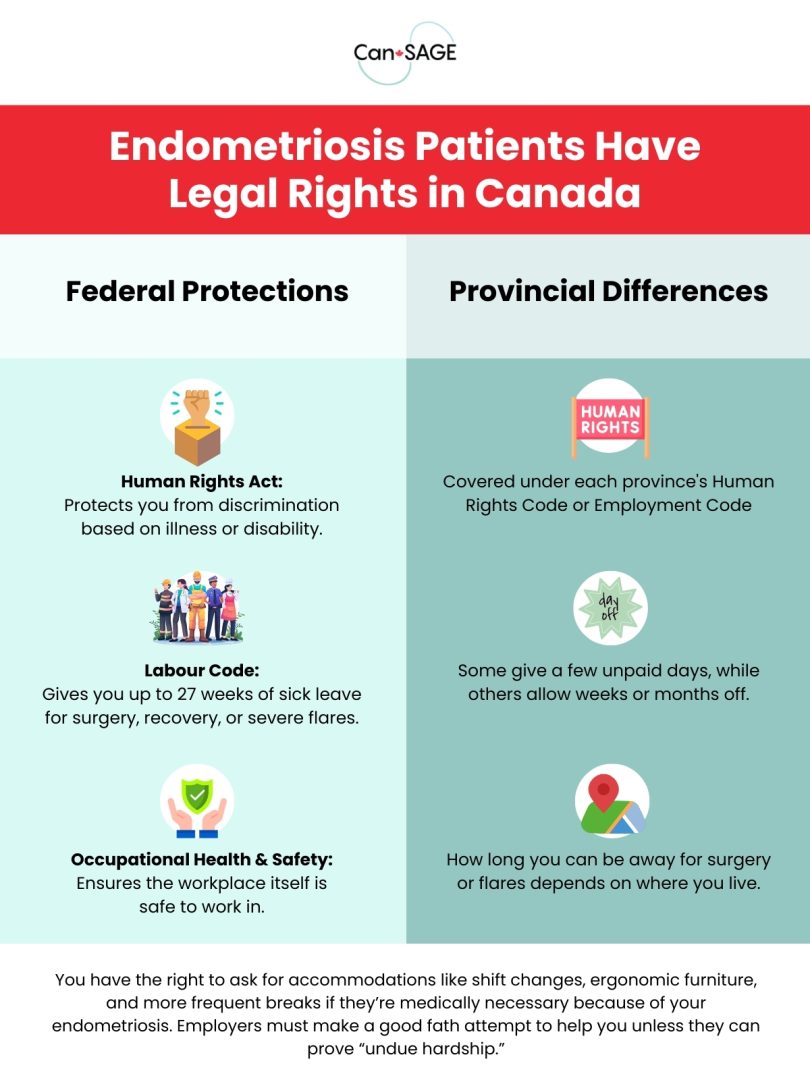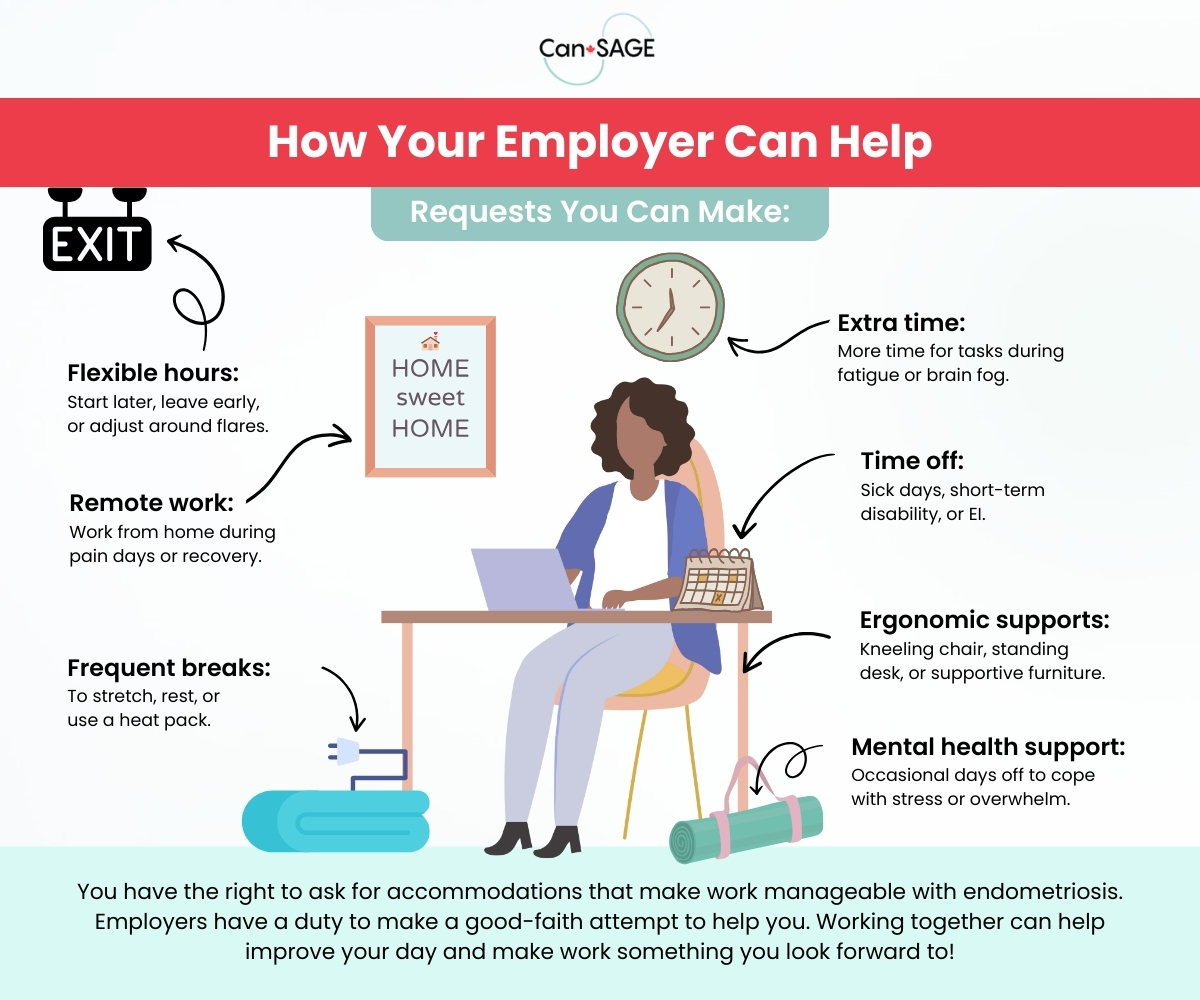Summary:
Patients can navigate the emotional toll of endometriosis by reaching out to trusted friends, family, doctors, or peer groups. Frameworks like the Spoon Theory by Christine Miserandino, DBT’s A.C.C.E.P.T.S., meditation, journaling, and the arts can help patients set limits, cope with difficult days, and manage stress. You also have a right to ask for accommodations at work, and your employer must make a good-faith attempt to provide them unless they cause demonstrable hardship.
Coping With Endometriosis: Mental Health, Supports, and Workplace Rights
Endometriosis affects much more than just your physical health. The chronic pain, unpredictable flares, irregular periods, fatigue, pain during sex, infertility and other challenges associated with it can wear away at your quality of life and even affect your ability to perform at work.
Prioritizing your mental health, building support into your life, and knowing your rights at work can help you cope and make life easier. This guide will show you what healthy support looks like, where to find it, how to protect your well-being, and how to ask for accommodations when you need them.
How and Where to Find Support
Effective support won’t look the same for everyone. What works for you might not work for someone else, but being aware of what’s available to you can help you find the best fit.
Consider exploring options like:
- Specialist referrals. Your primary care provider can help with referrals to community mental health professionals, psychologists, and psychiatrists.
If you are referred to a specialist, they’ll understand what you’re going through and may even be able to direct you to sources of support that work for other patients.
-
- Online support groups. The Endometriosis Network of Canada holds virtual support groups over zoom twice a month. You can find a list of other online groups at eMentalHealth.ca.
- In-person support groups. Ask your local Department of Health for info or put your city and postal code into Psychology Today’s online database.
-
- Sexual-health clinics. This includes most Planned Parenthoods as well as private and public clinics. Some hospitals have their own in-house clinics—call the switchboard to ask.
- Your school or workplace. Ask your employer about taking advantage of Employee Assistance Programs (EAPs) or whether you’re covered for private services. You don’t have to give a reason.
- The 811 nurse’s line. You can speak with a nurse or nurse practitioner by dialing 811 in most provinces. They can help with general questions about medication, symptoms, and more.
- 211. Some provinces also have a free 211 line you can call to ask about local community groups, non-profit and government organizations. Staff are trained to listen and find what you need.
- Friends or family you trust. Follow the acronym in the next section to find people who you can trust to show up for you when it matters most.
What Does Healthy Support Look Like?
Knowing where to turn for help is an excellent first step. It’s equally important to know what healthy supports look like and which ones will make it harder for you to cope instead.
Look for people and organizations that:
- Believe you when you share your story or talk about symptoms like pain and bleeding.
- Know and accept that your capacity changes day-to-day, especially during flares.
- Won’t guilt-trip you about cancelling plans or give unhelpful advice, like “just try harder.”
- Have the time, energy, and resources to help. Not everyone will, and that’s okay.
- Trust science, listen to experts, and want you to have access to safe, evidence-based treatments.
A bad source of support that’s toxic, takes advantage of you, or just generally disrespects you and treats you poorly can make you feel worse instead of better. That’s not helpful.
Spoon Theory and How it Applies to Endometriosis
Most endometriosis patients know that even simple tasks like taking a shower, getting dressed, or going to work can feel like a monumental task during a flare. Making people around you aware of the extra effort required for these common activities can help you experience less guilt and advocate for your needs.
Spoon theory may help. This framework wasn’t specifically created to help endometriosis patients, but it can be useful for illustrating how chronic conditions affect your routines.
The idea works like this:
- Each spoon is like a unit of energy.
- You start each day with a limited number of spoons.
- Minor tasks, like getting dressed or showering, all take up at least one spoon.
- More involved tasks like going to work or attending a social event naturally take up more.
- Once your spoons for the day are exhausted, it’s time to rest and recuperate.
When you aren’t in a flare, you might have plenty of “spoons” or even have some left over by the time you go to bed. You start the day with fewer spoons in the first place when you’re emotionally raw, struggling with symptoms, or just not feeling at your best—so you need to budget them carefully.
The core idea is simple: you can’t pour from an empty cup. If you push past your limits today, skip rest, or ignore your stress levels, it creates a deficit that continues to build over time, making everything worse.
Managing Your Stress
Stress doesn’t cause endometriosis, but having a lot of stress in your life is a known trigger for flare-ups and it can make your symptoms worse. The fact that up to two-thirds of all patients experience high levels of stress every single day makes learning how to manage it vital.
You can start working on this right now at home with:
- Breathing exercises. Take slow, steady breaths in a set pattern: in through the nose for 4, hold for 4, release for 4. Wait for 4, then repeat, or just breathe along with the video above this section.
- Journaling. Writing down your feelings about endometriosis or any other part of your life can help you get them out instead of ruminating on them. It can also help you spot patterns you don’t see.
- Gentle exercise. Go for a walk, try yoga, dance in your living room, or just stretch out your muscles one-by-one in bed if it’s been a rough day. It improves circulation and mood.
- Meditation. Sit quietly and focus on your breath, listen to a guided meditation, or listen to soft music. There is evidence to suggest it can help with pelvic pain and stress.
- Mindfulness. Just taking a few quiet moments to yourself to notice what you can see, smell, taste, hear, or touch can help ground you when you’re experiencing intense emotion.
- Art. Express your feelings through drawings, music, crafts, dance, or some other form of creative outlet. You don’t have to be good at it—just allow yourself to enjoy the process.
Dialectical Behavioral Therapy (DBT) and Cognitive Behavioral Therapy (CBT) can also be helpful for dealing with stress and the emotional side effects of endometriosis. If you’re not ready or still waiting to start therapy, you can find helpful info on mindfulness skills and more at DBTSelfHelp.com.
Coping With Difficult Emotions: A.C.C.E.P.T.S
When endometriosis symptoms are at their worst, just getting through the day can feel like an impossible chore. DBT can help you figure out how to deal with the difficult emotions that come up as they arise.
Use the acronym A.C.C.E.P.T.S:
- A – Activities. Find something to do that will keep and hold your attention that works within your current limits: cooking, reading, drawing, singing, music, or watching a show.
- C – Contributing. If you’re ruminating or stuck in a thought loop, try finding a way to do a good deed or help someone else (even if it’s small). Even just texting a loved one is enough.
- C – Comparisons. You can do hard things and get through difficult moments—you have in the past, and you will again.
- E – Emotions. Look for ways to trigger the opposite emotion to what you’re feeling right now. If you’re sad, watch a comedy. If you’re mad, look for stories about people doing something good.
- P – Pushing away. Compartmentalizing the problem (temporarily) is okay! Let yourself set it aside to deal with in the morning, after dinner, etc.
- T – Thoughts. Remind yourself that you are not your thoughts. Look for ways to change what you’re thinking about by engaging with your environment—like solving a crossword puzzle.
- S – Sensations. Use your five senses to ground yourself. Name five things you can see, hear, feel, smell, and taste right now.
Skills like these are also helpful for managing anxiety around procedures, surgeries, and appointments for your endometriosis. Like anything else, it takes a bit of time and practice for them to work.
When to Seek a Healthcare Assessment
Everyone feels sad, anxious, frustrated, angry, or even overwhelmed from time-to-time, but endometriosis can make feelings like these more common.
If any of the following apply, seek an assessment right away:
- You feel sad or depressed for more than two weeks.
- You’re losing interest in your favorite activities or hobbies.
- You are thinking about hurting yourself or others.
- You can’t sleep because of anxiety or stress.
If you feel you are currently in crisis, but aren’t necessarily in danger, you can also call the Suicide Crisis Helpline by dialing 988. Otherwise, you can make an appointment with your family doctor, browse the resources posted on Canada.ca, or reach out to your community mental health office.
How to Talk to Your Employer About Endometriosis
Pain, fatigue, heavy bleeding, and other symptoms of endometriosis can make it challenging to stay on top of your duties at work. Sometimes, just showing up and meeting your deadlines can feel impossible if you’re in the middle of a particularly bad flare or in a lot of pain.
You have a legal right to ask for accommodations at work that make it easier to manage your symptoms, stay productive, and hit your goals. If you do, your company must make a good-faith attempt to accommodate your request unless they can show proof that it’s impossible, unsafe, or would lead to serious harm.
Your Rights as an Endometriosis Patient
Federal laws protect you from discrimination based on defining characteristics, like race, national or ethnic origin, colour, religion, age, sex, sexual orientation, gender identity or expression, and disability. When it affects your daily life or ability to work, endometriosis is considered a disability.
Most protections fall under:
- The Canadian Human Rights Act. This makes it illegal for employers to treat you unfairly because of endometriosis or any other protected characteristic.
- Canada’s Labour Code. This gives you the right to take up to 27 weeks of sick leave in a year. You can take time off for a surgery like ablation or because you’re too unwell to work.
- Canada’s Occupational Health and Safety Regulations. This sets standards to ensure your workplace, tools, and processes don’t put your health at risk or make your endometriosis worse.
Sick days, union rules, and most other workplace regulations, including the number of paid or unpaid sick days you can take each year without penalty, are handled at the provincial level instead.
Provincial Human Rights Laws & Employment Standards
Each part of Canada has its own Human Rights Code and Employment Standards, and they vary slightly in scope and application. For someone with endometriosis, the biggest difference is typically in how much time off you can take without having to justify yourself or provide proof of illness.
This chart provides a quick reference guide showing the codes and standards for different provinces and territories:
| Province / Territory | Human Rights Laws | Employment Standards | Sick Leave Entitlement |
| Ontario | ON Human Rights Code | ON Employment Standards Act | 3 unpaid days/year |
| British Columbia | BC Human Rights Code | BC Employment Standards Act | 5 paid + 3 unpaid days/year |
| Alberta | AB Human Rights Act | AB Employment Standards Code | 5 unpaid personal/family responsibility days/year |
| Saskatchewan | SK Human Rights Code | SK Employment Act | Unpaid medical leave |
| Manitoba | MB Human Rights Code | MB Employment Standards Code | 3 unpaid days/year |
| Quebec | QC Charter of Human Rights and Freedoms | QC Act Respecting Labour Standards | Up to 26 weeks unpaid/12 months |
| New Brunswick | NB Human Rights Act | NB Employment Standards Act | 3–5 unpaid days/year |
| Nova Scotia | NS Human Rights Act | NS Labour Standards Code | 3 unpaid days/year |
| Prince Edward Island | PEI Human Rights Act | PEI Employment Standards Act | 3 unpaid days/year |
| Newfoundland & Labrador | NFLD Human Rights Act | NFLD Labour Standards Act | 3–7 unpaid days/year (length of service) |
| Yukon | YK Human Rights Act | YK Employment Standards Act | Unpaid (case-by-case) |
| Northwest Territories | NWT Human Rights Act | NWT Employment Standards Act | Unpaid (length of service) |
| Nunavut | NU Human Rights Act | NU Labour Standards Act | Unpaid (length of service) |
Asking for Accommodations
An “accommodation” can be anything that helps you do your job or manage your endometriosis. The only real rule is that what you ask for needs to be something they can reasonably provide. Companies can deny requests that would lead to extreme financial or logistical hardship for the business.
In legal terms, “hardship” means the requested accommodation is so costly that it threatens the viability of the business, puts your or someone else’s health at risk, or introduces serious safety concerns.
You can ask your employer about:
- Starting later, leaving earlier, or adjusting work around flares and symptoms.
- Changing your schedule to accommodate appointments or procedures.
- Working from home during flares, surgical recovery periods, and bad pain days.
- Taking frequent breaks to stretch, use heat packs, or apply a TENS machine.
- Calling in sick, going on short-term disability, or going on EI without penalties.
- Installing a kneeling chair, ergonomic furniture, or stand-up desk.
- Getting more time to complete projects when fatigue and brain fog are high.
- Taking a mental health day to cope with the emotional toll of endometriosis.
Try to give your employer as much notice as you can about what you need. It can take time for them to action the request, order new furniture, or change internal processes to accommodate you.
Providing Documentation or Proof
The only time you have to tell your employer is when you plan to ask for accommodations or need time off from work. Even then, the scope of what they can ask for is very narrow.
They can typically ask for:
- Confirmation that you have a diagnosed medical condition (but not necessarily what it is)
- How the symptoms of that medical condition affect your ability to do your work
- The details of any treatment plans (but only if they’re related to your ability to work)
- The overall prognosis or outlook for your condition.
Employers can only collect as much information they need to service your request or accommodate you. They can’t ask to see your full medical history, bloodwork, x-rays, medication lists, and other unrelated info unless they can justify why they need it to provide the accommodation.
Is Disclosure Right For You?
You deserve to feel safe and supported at work. Sharing that you have endometriosis can help you get the accommodations you need, but you should also know that disclosing could expose you to sexism, bias, stigma, or privacy issues. Your safety also matters.
To weigh the pros and cons, ask yourself:
- Why do I feel I need to share my diagnosis? You should have a good reason for sharing your private health info. If you don’t, keep it to yourself.
- What will disclosing help me achieve? If nothing will change or you won’t benefit from the changes, it may not be in your best interests—at least for now.
- What is the culture at my place of work like? Sexism, biases, stigma, and shame are still alive and well at some companies. Will you be treated fairly after you disclose, and if not, do you have the time/energy/resources to fight for your rights?
- How much info do I want to share? There is such a thing as “too much information” in a disclosure. Your employer doesn’t need the nitty gritty details to help support you.
- Do I feel comfortable with people knowing about my endometriosis? Some people are very private about reproductive health. It’s okay if you are, too.
Remember, there are no right or wrong answers here. You are always fully in control of how much or how little you disclose about your endometriosis.
Disclosure Examples That Preserve Your Privacy
| Situation | What the doctor’s note needs to say |
| Jill (cashier): Endometriosis causes back and leg pain, making it hard to stand for full shifts. She takes NSAIDs as needed. | “The patient has a medical condition that limits her ability to stand for long periods. Please provide access to a chair at her workstation.” (No need to mention endometriosis or medication.) |
| Priya (crane operator): Has endometriosis and uterine fibroids. Is scheduled for endometriosis surgery with hysterectomy to excise lesions and hopefully address pain. | “The patient is scheduled for abdominal surgery on Oct 5 and will need medical leave for recovery. Following surgery, patients should not operate heavy machinery or perform physically strenuous tasks for at least 6 weeks.” (Neither diagnosis is necessary to understand the risk or accommodate, here) |
| Sam (office worker): Endometriosis treatment includes medication in the evening that causes drowsiness. This makes night shifts difficult. | “The patient is being treated for a medical condition with medication that may impair alertness late in the day. Please schedule earlier or allow 2 additional breaks.” (No need to list the medication by name.) |
| Maya (teacher): Endometrial hyperplasia triggers heavy bleeding that sometimes requires urgent bathroom breaks. She also has endometriosis with lesions near the bladder. | “Patients may require frequent bathroom breaks without notice due to a medical condition. Please allow for frequent breaks or in-class assistance as required.” (It is not necessary to specify a diagnosis). |
| Alex (warehouse worker): Recovering from endometriosis surgery means Alex can’t lift anything over 5lbs for weeks. | “The patient is recovering from abdominal surgery. Advised not to lift more than 5lbs for the next 6 weeks.” (The important detail is the lifting restriction, not the diagnosis/surgery) |
Tip: Rules like these limit only the employer, not you. You always have the option to share more details, chat about your endometriosis at work, or update your boss more often.
How to Start the Conversation
Bringing up a private health issue at work can feel intimidating, especially if you aren’t sure how they’ll react at first. You can start the conversation with:
- A face-to-face conversation
- A handwritten or typed letter
- A letter from your doctor
- An email to your manager
Whichever option you choose, keep in mind that having a paper trail can be beneficial if you get questions or pushback later on. If you meet face-to-face, ask to record it or send an email after with the details.
Useful Conversation Starters:
- “I’m managing a health condition that affects my ability to focus. Can we discuss some simple accommodations that will help me stay productive?”
- “I need time off in July to recover from a medical procedure. I have documentation from my doctor that supports my request.”
- “I’m struggling with severe fatigue related to a medical condition I was diagnosed with last year. I’d like to explore a temporary schedule adjustment so I can meet my health needs and be at my best.
- “I have endometriosis, and my pain has become severe enough that I can’t manage my regular duties. My doctor is recommending short-term disability leave while we adjust my treatment.”
Start with someone in a position of authority at the company you feel you can trust, like your manager, a team leader, or an employee advocate. Some businesses will also let you bring in a support person.
What to Do If They Refuse Or Something Else Goes Wrong
Your employer might try to refuse your request or look for ways to avoid accommodating you. They may also make up an excuse to fire you, unfairly deny you disability or sick leave, make rude or sexist remarks, or just generally treat you poorly.
If this happens to you:
- Contact the Human Rights Commission in your province.
- File a complaint with your local employment standards office.
- If you’re unionized, ask your representative to advocate on your behalf.
- Browse the resources on the Endometriosis Network website to find advocacy groups.
- Ask your doctor to advocate on your behalf or update your documentation so your needs are clear.
If you were wrongfully terminated, retaliated against, or intentionally skipped over for a promotion, you may have the right to sue your place of work in civil court. This can be expensive, so it’s best to talk to a lawyer first. Many will provide a half-hour consultation for free.
Seeking Support for Endometriosis Improves Quality of Life
You might not be able to change the fact that you have endometriosis, but creating your own toolkit full of healthy coping strategies will help you survive it and protect your emotional wellness. What matters most is that you don’t need to walk this path alone. There are so many people out there who are ready to help.
For more resources, tools, and support, visit CanSAGE’s Endometriosis videos page.






